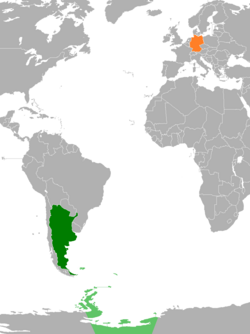Argentina-Germany relations
 |
|
|
Argentina |
Germany |
|---|---|
Argentina–Germany relations are foreign relations between Argentina and Germany. The free city-state of Hamburg was the first German state to establish diplomatic relations with Argentina in 1829. The first ambassador of Germany to Argentina was sent on 7 May 1871.
German immigration in Argentina is the largest in Hispanic America. Over 3,000,000 Argentines are of German descent.
They had great influence in the Argentine education system and many German schools were a place in the country. In fact, the Argentine army planned to recruit a large number of German scientists and technicians for industry. Many German entrepreneurs and professionals believe that Argentina was industrialized and could be narrowed through greater ties of German technology. The creation of newspapers in German as Argentinisches Tageblatt, which means "Argentine newspaper" outstanding and continues to this day.
The German Ambassador to Argentina is Bernhard von Waldersee and the Argentine Ambassador to Germany is Luis María Kreckler.
Trade developed between Germany and Argentina as early as the German Unification. Later on, Argentina maintained a strong economic relationship with Germany and supported them with supplies during World War I.
By the beginning of World War II, Argentina had a significant population of ethnic Germans. One area where they were particularly prominent was Misiones Province, Argentina's northeastern panhandle bordering on Paraguay and Brazil. It is estimated that by the early 1940s, there were around 10,000 ethnic Germans in Misiones, out of the province's total population of 190,000. With the rise of Nazism in Germany, Nazi agents started active propaganda work among the ethnic Germans living in Argentina, with Nazi-organized meetings reportedly held as early as 1933. The pro-Nazi-Germany atmosphere in some small, predominantly German communities of the northeast was so intense during WWII, that some Argentinian officials who visited such towns reported that they could hardly feel themselves to still be in Argentina. The Nazis were strongly opposed by the local Polish-Argentinians, as well as by the anti-Nazi German-Jewish minority. Argentina stayed neutral during the whole of World War II, declaring war on Germany only just before its capitulation. To postwar Germans, Argentina was the most desirable destination for middle- and upper-class emigrants next to Switzerland. Many returned after the fall of Peron. However, Germans traditionally consider themselves to have a Special Relationship to Argentina and Chile, two countries maintaining an unabated state of friendship in good as in bad times.
...
Wikipedia
